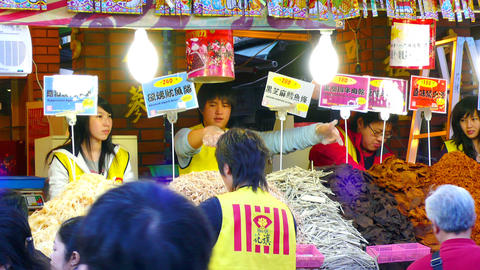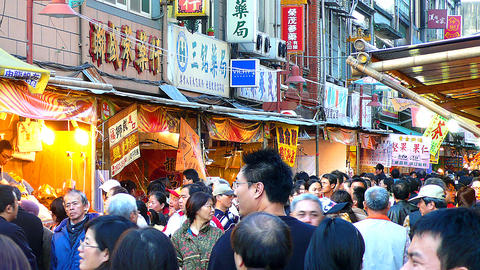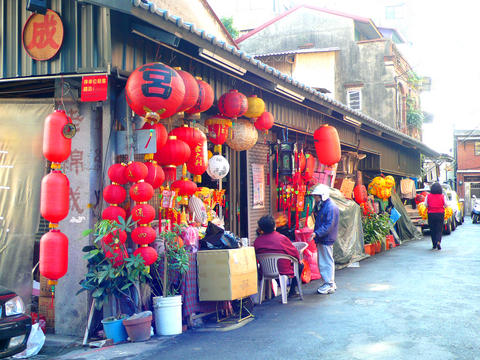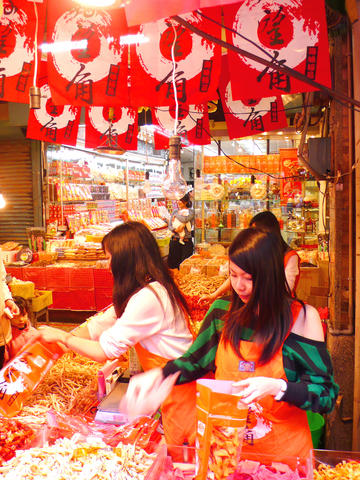Myriad customers, even more goods and a rare peak of sunshine set the scene on Dihua Street (迪化街) last Friday afternoon. This traditional market isn't the only place to buy New Year's necessities: Ningxia Night Market (寧夏夜市), Taipei City Mall (台北地下街) and other commercial venues are part of the Taipei Big Street New Year Shopping Festival (台北年貨大街).
During the 19-day shopping marathon, Dihua Street, the main thoroughfare, is lined with stalls and hawkers peddling nuts, candy, fried snacks, sausages, Chinese herbs and teas, preserved fruits and decorations. Goods pitched as quality imports - ice wine from Canada, Iranian dates and health food from New Zealand - add a cosmopolitan flavor, but the authenticity of the merchandise is a matter of debate.
The hub is best known for traditional items, but novelty still abounds. One vendor, for example, sings to a techno beat, touting beef jerky and fried fish at Xiahai Chenghuang Temple (霞海城隍廟), an oft-visited spot which dates back to 1859 and is home to more than 600 statues of deities.

PHOTO: HO YI, TAIPEI TIMES
Despite the occasional avant-garde manifestations, though, tradition is still valued and preserved. Visitors eat their way through bins of Taiwanese sweets as traders give away samples of their wares. However, those who come back for seconds may be called out, as one shopper was. "Did you see that woman?" said a vendor, rolling his eyes and pointing a finger, "She just put all the samples in her plastic bag and left."
To accommodate serious buyers, postal and express delivery services are available to send anything that can't be carried anywhere in the world.
Besides free eats and party supplies, the street also offers a taste of yesteryear.

PHOTO: HO YI, TAIPEI TIMES
To look for true traditional holiday treats, one needs to step away from street stalls and into the shops steeped in history such as Lin Fu Chen Company (林復振商行). Trading traditional foodstuffs since 1853, the store is part business, part tourist attraction. It takes its trade seriously: premium abalone, shark fin, sea cucumber and snakehead fish roe (烏魚子) stacked up on the shelves can fetch up to NT$18,500 per jin (斤, or 600g).
Qian Yuan Hang (乾元行), a Chinese medicine store, is a textbook example of the colonial Baroque architecture of the Japanese period, which has been in operation for more than a century. This time of year, though, business is slow.
"Lunar New Year holiday is a low season for us since old people follow the taboo of not taking medicine during this time of the year," one of the shop staff explained.

PHOTO: HO YI, TAIPEI TIMES
Many other Chinese medicine stores, however, try to minimize profit loss by branching out to sell holiday specialties such as dried mushrooms, dried jellyfish (海蜇皮), Chinese herbs, grains, nuts and other nutritious items.
On Guisui Street (歸綏街), which intersects Dihua Street the holiday racket ceases. Here, time takes its toll on incense shops, lantern and oil stores, farming-implement businesses and a poultry depot reminiscent of Fujian-style architecture and the Western-style two-story buildings dating back to the 1860s.
One of the few businesses that draws holiday shoppers on the northern section of the street is Li Ting Hsiang Bakery (李亭香餅舖), which has become famous for traditional pastries over the last 60 years.

PHOTO: HO YI, TAIPEI TIMES
Provender and history aside, performances add to the festival cheer and keep the shoppers entertained. The playbill (available in full at www.2008tpe-bigstreet.tw) announces glove puppet shows, ballroom and belly dancing, tea appreciation lessons as well as cooking demonstrations that will take place on the plaza in front of the Yongle Market building (永樂市場), Dadaocheng Park (大稻埕公園) on Guisui Street and the square at Taipei City Mall starting today.
While Dihua Street satisfies the appetite, Huayin Street between Chongqing North (重慶北路) and Taiyuan (太原路) Roads looks after appearances: clothes, shoes, leather goods and accessories are the themes here. At the commercial circle behind Taipei Main Train Station (後火車站商圈), located on Chongqing N Road between Changan West (長安西路) and Zhengzhou (鄭州路) roads, stores supply general merchandise - toys, clothing, bling, ornaments and cosmetics. Both places are wholesale markets and will appeal to bargain hunters.
The easiest way to get around the shopping zones is by MRT. The Shuanglian, Taipei Main Station and Zhongshan stations are the nearest exits. A special Lunar New Year Shop-Around bus, number 518, runs through the Neihu District, Minsheng East and West roads and Taipei Main Station to drop shoppers off at the doors of commercial venues.

On April 26, The Lancet published a letter from two doctors at Taichung-based China Medical University Hospital (CMUH) warning that “Taiwan’s Health Care System is on the Brink of Collapse.” The authors said that “Years of policy inaction and mismanagement of resources have led to the National Health Insurance system operating under unsustainable conditions.” The pushback was immediate. Errors in the paper were quickly identified and publicized, to discredit the authors (the hospital apologized). CNA reported that CMUH said the letter described Taiwan in 2021 as having 62 nurses per 10,000 people, when the correct number was 78 nurses per 10,000

As we live longer, our risk of cognitive impairment is increasing. How can we delay the onset of symptoms? Do we have to give up every indulgence or can small changes make a difference? We asked neurologists for tips on how to keep our brains healthy for life. TAKE CARE OF YOUR HEALTH “All of the sensible things that apply to bodily health apply to brain health,” says Suzanne O’Sullivan, a consultant in neurology at the National Hospital for Neurology and Neurosurgery in London, and the author of The Age of Diagnosis. “When you’re 20, you can get away with absolute

May 5 to May 11 What started out as friction between Taiwanese students at Taichung First High School and a Japanese head cook escalated dramatically over the first two weeks of May 1927. It began on April 30 when the cook’s wife knew that lotus starch used in that night’s dinner had rat feces in it, but failed to inform staff until the meal was already prepared. The students believed that her silence was intentional, and filed a complaint. The school’s Japanese administrators sided with the cook’s family, dismissing the students as troublemakers and clamping down on their freedoms — with

As Donald Trump’s executive order in March led to the shuttering of Voice of America (VOA) — the global broadcaster whose roots date back to the fight against Nazi propaganda — he quickly attracted support from figures not used to aligning themselves with any US administration. Trump had ordered the US Agency for Global Media, the federal agency that funds VOA and other groups promoting independent journalism overseas, to be “eliminated to the maximum extent consistent with applicable law.” The decision suddenly halted programming in 49 languages to more than 425 million people. In Moscow, Margarita Simonyan, the hardline editor-in-chief of the